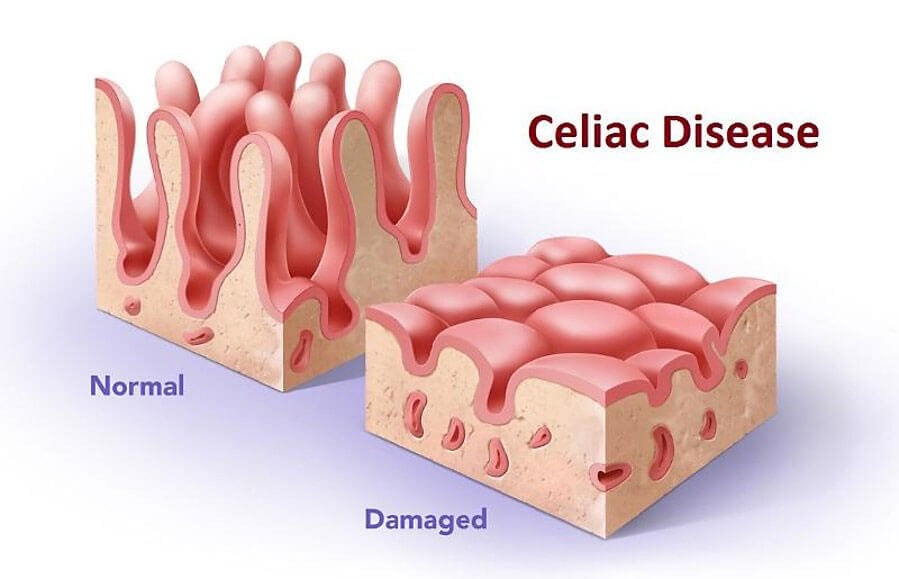What Is Celiac Disease?
“Celiac disease is an autoimmune disorder that causes damage to the small intestine, which can lead to malabsorption of nutrients. A genetic intolerance to gluten, a protein found in wheat, rye and barley, triggers this destructive reaction of the immune system”, according to Dr. Peter Green of Columbia University Medical Center, and one of the premier celiac specialists in the world. Indeed, I reference his book, “Celiac Disease: A Hidden Epidemic” throughout this page.
Many researchers theorize that celiac disease has been around since humans switched from foraging and hunting to domestic agriculture. The exact cause of the disease is unknown, but it tends to be inherited. There is a 5 to 15 percent chance that you may have the disease if someone in your family does. The disease may also emerge after some form of trauma (infection, injury, severe stress, surgery, etc). Like diabetes, it is an autoimmune disorder, not a food allergy that people grow out of.
There currently is no cure for celiac disease. The only treatment is a gluten free diet.
What Are The Symptoms Of Celiac Disease?
Everybody reacts differently. Symptoms of celiac disease vary from one person to the next. The majority of complaints consist of, though are not limited to:
- diarrhea
- weight loss
- abdominal cramps, gas and bloating
- anemia
- fatigue
- foul-smelling or grayish stools that may be fatty or oily
- stunted growth (in children)
- osteoporosis
Other issues attributed to celiac disease include:
- irritability or depression
- stomach upset
- joint pain
- muscle cramps
- skin rash
- mouth sores
- dental and bone disorders (such as osteoporosis)
- tingling in the legs and feet (neuropathy)
Dr. Green has dubbed celiac disease as the “great pretender.” Its protean symptoms and systemic manifestations can easily masquerade as a number of other illnesses. Some people report having no symptoms at all.

Free exclusive eBook, plus recipes and health tips, delivered to your inbox.
How Do I Know If I Have Celiac Disease?
Celiac disease is particularly challenging to diagnose. Dr. Green suggests the following blood tests in aiding in the diagnosis of of celiac disease:
- Anti-gliadin antibodies (AGA) both IgA and IgG
- Anti-endomysial antibodies (EMA) – IgA
- Anti-tissue transglutaminase antibodies (tTG) – IgA
- Total IgA level.
For test results to be accurate, a person must be consuming gluten, as these tests determine if you are having an immune response to it. The simple blood tests above can be ordered by any internist. If your doctor won’t order the test, find one that will. Remember, you can have celiac disease and still have negative blood tests.
I would also recommend genotyping from Enterolab. Having at least one of these genes, HLA DQ2, DQ6 and DQ8 are necessary to develop celiac disease. Since 1/3 of the general population have these genes, the presence usually means they have a genetic compatibility with celiac disease. Conversely, the absence of DQ2/DQ6/DQ8 almost certainly rules out celiac disease.
Treating Celiac Disease With A Gluten Free Diet
You can effectively manage celiac disease with a gluten free diet.
Celiac disease can be effectively managed by avoiding food with gluten (and foods that are often contaminated with gluten). This includes:
- Any type of wheat, including spelt, kamut, bulgur, durum, semolina, triticale, etc.
- Any type of barley or malt (food additives)
- Rye
- Amaranth and buckwheat
- Oats
How do you know the food you buy is gluten free, if it does not have the gluten free label? One of the easiest answers is to stay away from processed foods. Many of the foods that are commonly allergenic did not exist in their current, peculiar, omnipresent forms a century ago –think peanut oil, high fructose corn syrup and soy –cheap, subsidized products pervasive in today’s processed foods.
Fear not. Although you may not be able to eat your favorite bread or crackers anymore, there are alternatives. There are plenty of gluten free recipes online and beyond.
Celiac Disease Research And Helpful Links
Research
The University of Maryland Center for Celiac Research
Celiac.com
Mayo Clinic
Articles
Getting The Gluten Out
Jury Is Still Out on Gluten, the Latest Dietary Villain
Celiac Disease: Myths and Facts (PDF)






Kimrose says
I have been amazed lately listening to Dr Peter Osbourne speak about how all grains have some form of gluten in them…..like rice, and how if you have the genes, even if not diagnosed with celiac, but have NCGS …non celiac gluten sensitivity you must also avoid all grains.
Elana says
Kimrose, thank you for your amazing comment! I gave up all grains (including rice, etc.) over 20 years ago for this very reason :-)
Holly says
Good reminders. My celiac kicked into gear after the birth of my second son- its been 26 years. Last year for the first time l had an endoscopy, and my doctor said it looked like uncontrolled celiac- which is bizarre because l never ever cheat, gave up all grains, and don’t eat processed foods. She sent me to an allergist who said it must be in my medications or cookware. It could be the former, though l’ve done what l can to check, and the latter just doesn’t seem right. I’m back at square one trying to figure this out. The doctor has lost interest. Not sure what to do next. Thoughts anyone?
Elana says
Holly, that sounds like such a challenging situation. I’ve found that most doctors who practice conventional medicine are like this which is why I’ve gone to Functional Medicine doctors quite a bit over the years –they tend to want to get to the bottom of an issue!
Wendy says
I’ve been celiac for 20+ years and never knew it put me at risk for osteoporosis. Now I have been diagnosed with severe Osteoporosis after insisting on a bone scan after I broke both arms from a fall. Just writing here so that women with celiac know to take calcium and get a bone density scan at menopause to establish a baseline. Don’t wait like I did.
Elana says
Wendy, thanks so much for your comment. The reminder for those of us with celiac to get DEXA bone scans is a great one. The calcium has become a bit controversial of late vis a vis CVD :-)